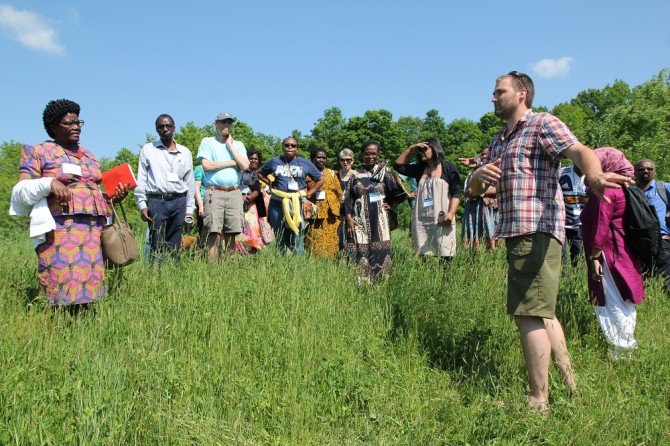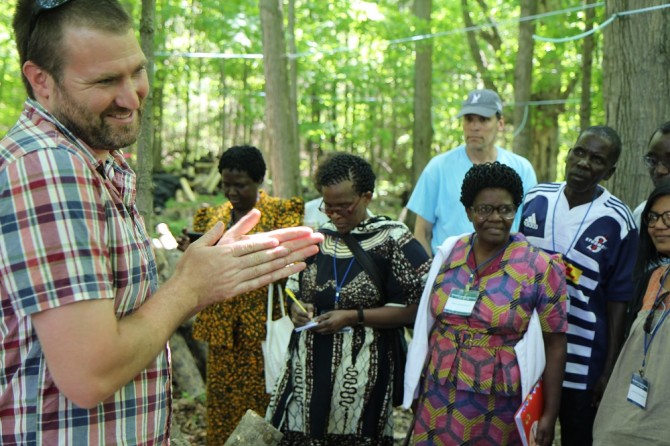
Participants from India, Malawi, Tanzania, Canada and the United States dance at the wrap-up session of the Ecological Learning Collaboratory.
‘Collaboratory’ shares ideas on food, healing, justice
By Jonathan Miller
The wrap-up session for the inaugural meeting of the Ecological Learning Collaboratory was not your typical academic exercise.
In a sunlit room at Carl Becker House, 16 people danced to songs in Swahili (from Tanzania), Tumbuka (from Malawi), and Tamil (from southern India). As each song ended, the group erupted in shouts and raucous laughter.
After five days of meetings at Cornell and around Ithaca, the songs were a reminder of the participants’ roots in places far away. But the smiles and hugs suggested that people steeped in different realities can find plenty to share with one another.
The idea for the “collaboratory” was born when Cornell faculty members Rachel Bezner Kerr (development sociology), Neema Kudva (city and regional planning) and Stacey Langwick (anthropology) found themselves at a meeting in Mysore, India. The three came from different disciplines and different colleges, but they had much in common.
Each was distrustful of traditional models of technology transfer, in which experts from wealthy countries tell people in poorer countries how to manage their affairs. And each had built long-term collaborations with grassroots groups in the global south.
Bezner Kerr had helped start Soils, Food and Healthy Communities, a farmer-led organization in Malawi that focuses on connections between agroecological farming, diversified diets and gender relations. Kudva had been involved with the Keystone Foundation, which works with indigenous people in the Nilgiri Biosphere Reserve in southern India, and was the lead faculty member of the Nilgiris Field Learning Center there. Langwick was working with several groups in Tanzania, including a nonprofit providing medicinal plants to people with AIDS and a medical school concerned with maternal nutrition.
While the organizations were very different, each worked at the intersection of health, food, livelihoods, environmental sustainability and social justice. Why not bring them together and see what they could learn from one another?
“We were really interested in what it means to think about producing knowledge around ecological learning – around finding solutions to wicked problems about ecological devastation or conservation or the like,” said Kudva. “And then to ask, ‘What role does an institution like Cornell play? What role do institutions of the north play, if we want to change the locus of power?’”
The kickoff meeting, May 29 to June 2, was supported by the San Giacomo Foundation through a gift to Cornell’s Mario Einaudi Center for International Studies. The university’s South Asia Program, Institute for the Social Sciences and Office of Engagement Initiatives also contributed.
The program featured presentations by Cornell faculty members Tom Seeley (biology), Aaron Iverson (entomology), Kate Dickin (nutritional sciences), Alex Travis (biomedical sciences), Karen Purcell (Laboratory of Ornithology), Nancy Chau (Dyson School), Steven Wolf (natural resources), Emily Detrick (Cornell Botanic Gardens) and Jane Mt. Pleasant (horticulture).
Attendees also visited several projects in the Ithaca area, including Wellspring Forest Farm in Trumansburg, New York, the Ithaca Free Clinic, GreenStar Cooperative Market, Groundswell Incubator Farm, Youth Farm Project and the Ithaca Festival. Each participating group also had a chance to present its work.
“This week has been very wonderful and exciting for me,” said Helen Nguya, founder and director of Training Research Monitoring and Evaluation on Gender and AIDS in Arusha, Tanzania. She said she was inspired by sessions by local practitioners on cultivating mushrooms and involving youth in agriculture. She was also impressed by the Indian group’s work in small-scale food processing, and by the way the Malawians had convinced village men to help with cooking for their households.
“And also, my colleagues from other countries, they have learned from us,” Nguya added.
Cornell’s Kudva said the collaboratory is “really an experiment,” and that she and her colleagues were prepared to “let it grow its way into a plan of action.” But several participants said they hoped the group would stay together.
“Whatever ideas are generated here, we will continue discussing,” said Laifolo Dakishoni, a trainer with Soils, Food and Healthy Communities. “This will be an evolution. We’ll get some ideas, we’ll test them under our own conditions, and if it doesn’t work we’ll go back to the people where it is working … and get their advice.”
“I think there’s a lot of learning to be done between groups in the Southern Hemisphere,” agreed Anita Varghese, deputy director of the Keystone Foundation. “Having the academic hub here [at Cornell] helps to process that.”
Masayoshi Ishida, a professor of gastronomy at Ritsumeikan University in Japan, took part in the workshop. His university recently signed a memorandum of agreement with the Einaudi Center, in part to lay the groundwork for future collaboration on issues of food and social justice. Faculty at the University of Gastronomic Sciences in Pollenzo, Italy, have also expressed an interest in being involved.
“I’m sure this will not stop here,” Varghese said. “I’m looking forward to having several of the groups here visit us at our field sites, and some of us getting the chance to go to their areas and seeing what’s happening.”
Jonathan Miller is associate director for communications at the Einaudi Center.
Media Contact
Get Cornell news delivered right to your inbox.
Subscribe


